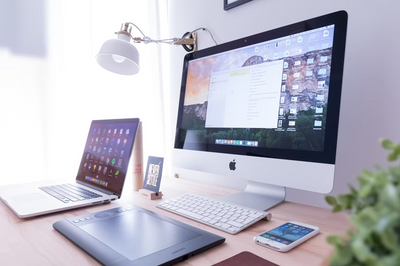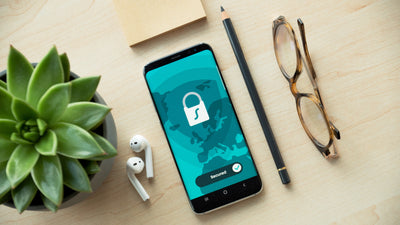Cybersecurity: How private is your personal life?

“We lock our doors at night and expect our houses to be secure,” says Conscious Spaces founder Tara Williams. “But the fact that technology is capable of seeing into your home, listening to your conversations, keeping track of your activity and storing that information as data…people need to be aware of it.”
From smart tech to the Internet of Things (IoT) and the Internet of Bodies (IoB), cyberattacks to 5G networks, our most intimate details are increasingly vulnerable – and the question of securing our identities and protecting our freedoms online has never been more pressing.
2020: The year cybercrime exploded
With a rapid rise in remote working and millions shopping and socialising online, fraudulent activity reached a peak during lockdown.
In the last year alone, more than 6,000 cases of cybercrime were recorded by UK police, with £34.5m stolen through online fraud since 1 March 2020.[1]
Even established organisations – with their well-oiled and carefully armoured systems – have felt the force of cybercrime. Several attempts have been made to breach the NHS, while elite IT company SolarWinds was the subject of a colossal cybersecurity attack[2] which went undetected for months. By gaining access to SolarWinds’ systems, foreign hackers were able to spy on the upper echelons of the US Government – and it could be years before the networks are secure again.[3]
Just this month, reports[4] surfaced of a massive new Facebook data breach. It emerged that half a billion Facebook users’ accounts were stolen, with personal information including telephone numbers and birth dates compromised and made available on a website for hackers. Facebook’s response? That it was “old data”. As Carole Cadawalladr wrote in the Guardian, “these are the actions of a company that knows it can get away with it. And repeatedly does.”
"In the last year alone, £34.5m was stolen through online fraud."
Under surveillance: The rise of smart tech
But it’s not just hacks and scams that pose a potential problem. With the evolution of smart cities, the roll-out of 5G networks and the development of the Internet of Things (IoT) and the Internet of Bodies (IoB), many feel that privacy and personal freedoms are being silently eroded.

“How are smart cities going to change the way we live, and how are we prepared to manage the risk that comes with that?” asked[5] Adam Bolio of consulting company Deloitte at the 2019 US Chamber Cybersecurity Conference in San Diego.
Like so many metropolises, San Diego has invested heavily in smart technology in recent years – including smart street lamps fitted with cameras and capable of recording, amongst other things, how many people walk past and driver patterns.
San Diego resident Brian Walker is sceptical: "It’s like, what’s the purpose? And who’s the company that is the third-party source that’s doing all this monitoring and what are their intentions in the first place?"
But smart street lamps are just one tiny cog in the bigger wheel of the Internet of Things (IoT): a digital web of devices that’s growing ever more intricate.
"With the evolution of smart cities, the roll-out of 5G and the development of the Internet of Things, many feel that personal freedoms are being eroded."
What is the Internet of Things?
From surveillance cameras to smart speakers (like Amazon’s Alexa), thermostats to traffic lights, many modern devices – both trivial and powerful – can now be linked online, facilitating a kind of constant data conversation. The connection of these internet-enabled devices is known as the Internet of Things (IoT), and it’s seen as the future of both work and play.
Within this broader Internet of Things (IoT) lies a growing industry of devices that monitor the human body and transmit the data they collect online. This is called the Internet of Bodies (IoB).
The best-known of all the IoB devices is the smartwatch. Able to receive emails while it measures your heart rate, the smartwatch can also measure your blood oxygenation level, track your exercise – and even call an ambulance if you fall over and don’t get up. And, according to reports, a pair of smartglasses – able to record, digitalise and data-scrape all that we see – could be released by Apple as soon as 2022, turning us into walking CCTV cameras. "We won’t be able to opt out from wearing AR glasses in 2035 any more than we can opt out of owning smartphones today,” writes the developer Adrian Hon.
But the Internet of Things – IoB included – has its weaknesses, and they’re becoming more apparent.
On 11 January 2021, Ubiquiti Inc. – a major retailer of IoT devices such as routers and security cameras – suffered a catastrophic breach, with access to customers’ devices in businesses and homes around the world at risk.
According to Chief Technology Officer Santeri Kangas, “each new component added to the network poses a new possible risk and widens the attack surface for each household.”[6]
“This attack area for households is already large,” says Santeri. “On average, there are 17 devices connected to the internet for a single household.”
From computers to phones, games consoles to smart TVs, these 17 (or so) devices are continually collecting your private data, sending it to the cloud and acting as a possible entry point to your information.
Smart speakers like Amazon Echo and Google Nest can even record your conversations – and store a log of these snippets for later analysis. As the writer Adam Clark Estes put it: “By buying a smart speaker, you’re effectively paying money to let a huge tech company surveil you.”
"From street lamps to smartwatches, sound systems to surveillance cameras, many modern devices can now be linked online, facilitating a kind of constant data conversation."

What has 5G got to do with all this?
The evolution of the IoT and the rise of smart cities is made possible by the super-speed connectivity of new 5G networks.
“5G will act as the connective tissue of tomorrow’s digital economy, linking everything from smartphones to wireless sensors to industrial robots and self-driving cars,” says Malcolm Johnson of the International Telecommunication Union (ITU).[7]
According to Leftonic, 5G is expected to cover almost 40% of the world by 2024, with lightning-quick data transfer speeds of up to 10GB per second. And while this will give mobile broadband a massive boost, some are worried that these high-speed data transfers will open the door to new cybersecurity threats – not to mention the associated health risks from increased electromagnetic radiation.
"Criminals want to steal your identity, they want your credit information, they want to become you.”
The everyday impact of our interconnected world
All this talk of cybercrime can feel irrelevant on a personal level. Who’s interested in hacking into your iPhone photos of your cat, or your Friday night Spotify playlist, after all? (Although petitions like this suggest that even listening to your favourite tunes on Spotify might not be safe…)
For Kevin Mitnick, an ex-hacker who spent five years in prison and now uses his knowledge for good, this is the wrong attitude.
To people who feel they have nothing to hide, Mitnick has a test: “I say cool, unlock your phone for me. Cool, can I check your emails and texts? "Oh no." Well, why not? You have nothing to hide. Then it becomes, "Oh shit, I'm not going to do that."[8]
“When you're having personal phone calls at home,” Mitnick continues, “do you want somebody on the extension listening to you? It's uncomfortable, it changes your behaviour, it's something that violates your fundamental right to being private. You have a right to speak your mind, think how you want to think.”
Employers can also now legally monitor a lot of your work, Mitnick claims. “And criminals, they want to steal your identity, they want your credit information, they want to become you.”

A sign of things to come?
Given what followed the World Economic Forum’s 2019 pandemic simulation exercise Event 201, it’s interesting to note that this July, the Forum is preparing to host a ‘Cyber Polygon’ conference. Focusing on the need to protect against a future cyberattack, Cyber Polygon 2021 will take participants through a ‘real-time’ role play exercise, showing how to mitigate a supply chain attack on a ‘corporate eco-system’. Whether an eerie sign of things to come or simply an exercise in preparedness, it seems to signal that cybercrime is something that’s here to stay.
The solution: how to protect your privacy and data online
Now that you know the insidious ways cybercrime can sneak into your life, spy on your activity and steal your assets – on top of the tech giants’ dirty habit of disregarding personal freedoms – you’re probably wondering what you can do to keep yourself safe online.
Read the next article in our cybersecurity series 10 ways to start protecting your digital privacy to discover the simple steps you can take, starting from today.
References
[1] https://www.bbc.co.uk/news/technology-56499886
[2] https://www.reuters.com/article/us-usa-cyber-treasury-exclsuive/suspected-russian-hackers-spied-on-u-s-treasury-emails-sources-idUKKBN28N0PG?edition-redirect=uk
[3] https://www.businessinsider.com/solarwinds-hack-explained-government-agencies-cyber-security-2020-12?r=US&IR=T
[4] https://www.theguardian.com/technology/2021/apr/11/another-huge-data-breach-another-stony-silence-from-facebook
[5] https://www.kpbs.org/news/2019/aug/16/cyber-security-concerns-emerge-san-diego-transitio/
[6] https://bdtechtalks.com/2020/01/24/smart-home-iot-security/
[7] https://www.geospatialworld.net/article/5g-and-geospatial-will-together-power-future-cities/
[8] https://www.cnet.com/news/kevin-mitnick-hacker-knows-best-privacy-tips/








































